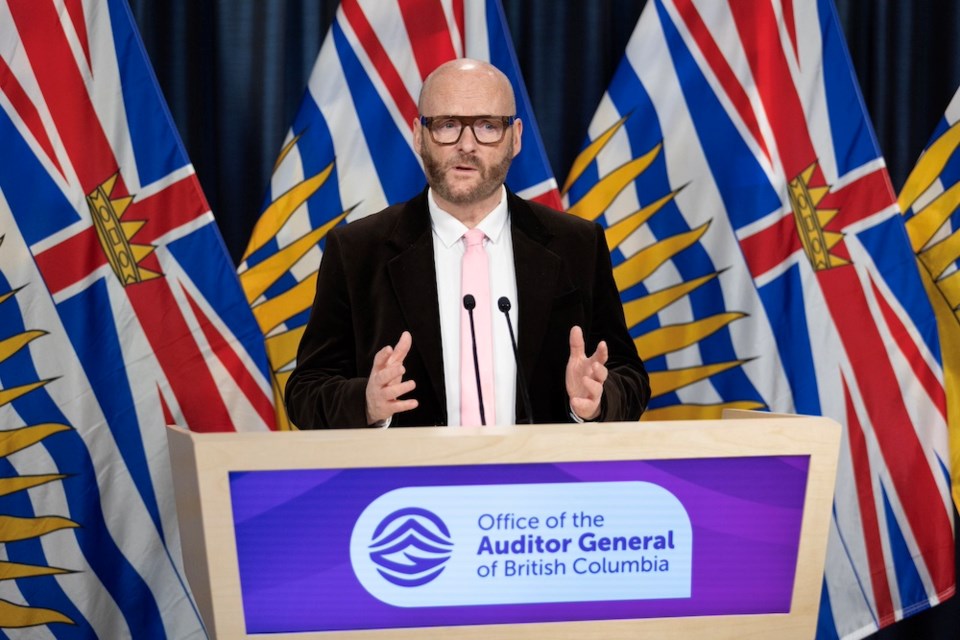The number of hazardous spills in British Columbia has trended upward over the last several years, making it even more important for the government to prepare, auditor general Michael Pickup says.
His latest report released Tuesday says the Ministry of Environment is not effectively managing hazardous spills in the province, and is using a decade-old response plan and data that is not easily accessible.
“Whether it’s fuel from a motor-vehicle incident or a leak from a sunken or grounded boat, thousands of spills are reported every year and the number has trended higher,” Pickup said in a statement.
“When high-risk incidents happen, the ministry responds appropriately. But effective management is more than that.”
Pickup’s report shows 5,306 spills and other environmental emergencies were reported in the 2021-22 fiscal year, up from 4,436 in 2018-19. Numbers for the 2022-23 fiscal year show 4,889 reports.
The report says the province’s current plans for responding to a major spill are about 10 years old.
Pickup told a news conference that risk levels, technology and the people involved in an emergency can all change over time.
He said there are thousands of spills each year, requiring a plan to be “evergreened” and “kept current.”
The report makes nine recommendations, including that the province update its plans for major spills, and improve the effectiveness of its cost-recovery process.
Environment Minister George Heyman said in a statement that his office accepts all of Pickup’s recommendations. “The auditor general’s recommendations reinforce the work we are doing to strengthen and improve our processes, and our engagement with the office of [the] auditor general is informing our work to develop a new environmental-emergency management action plan,” he said, adding the plan will be released later this year.
The report says the government didn’t consistently notify First Nations communities of hazardous spills, and millions of dollars owed to the province haven’t been recovered from those responsible.
It says from April 2016 to February 2023, approximately $900,000 in spill-related costs were recovered, while about $13.9 million remains outstanding, almost entirely from the cleanup in 2019 of the Neucel pulp mill site.
After the company in Port Alice on Vancouver Island went bankrupt in 2020, the government began legal action to recover costs.
“Two of the staff we interviewed told us the program lacks capacity for cost recovery. One explained that program staff responsible for this area don’t have the time or the financial expertise to perform this work,” the report says.
The report says the ministry collects provincial-level data, including information on the status of spills by region, but the system was difficult to use and most staff required IT support to put the information into a usable format.
In response to Pickup’s report, the ministry says it has launched a pilot program using a web-based software system to help inform First Nations of incidents and it is currently reviewing its cost-recovery procedures.
It says the ministry will work with the software system provider to improve access to data about spills.
“Our upcoming action plan will ensure that hazardous spills are prevented, contained and remediated effectively, and that communities have a full and prompt understanding of any impacts to the health of their environment,” Heyman said.
Peter McCartney, a climate campaigner for the Wilderness Committee who works mainly on oil and gas spills, praised Pickup’s work. “I think the auditor general nailed it,” he said, adding the most significant finding was that the province doesn’t have an “adequate, current, up-to-date” response plan for major hazardous spills.
“That’s really concerning to me, given that we’ve been opposing the Trans Mountain Pipeline expansion for over a decade.”
The expansion — which involves twinning the 1,150-kilometre pipeline between Edmonton and Burnaby — is nearing completion, he said. “And for the province not to be prepared for a major spill along that route is terrifying and unacceptable.”
Past responses to spills have been “really haphazard,” said McCartney, who blames the companies involved as well as the province, in part.
Official reports can contradict what is being seen on the ground, he said. Initial reports may say there were small amounts of oil involved, downplaying the severity, McCartney said. But as information is updated, spills may turn out to be larger.
As for notifying First Nations, McCartney said it’s imperative. “It’s 2024,” he said, adding First Nations “need to be right up there in terms or knowing what is going on on their territory. Because it is their community members who are out on the land and harvesting who are most at risk from a spill of hazardous materials.”
Port Alice Mayor Kevin Cameron said the initial response to the situation at the Neucel mill was poor but that since PricewaterhouseCoopers took over cleanup management, the work has been “textbook.”
Council meets every Monday with PricewaterhouseCoopers representatives and additionally meets every quarter during the year to discuss mill cleanup.
The company is watching costs carefully and its senior staffer in the small community of just over 700 people is “making sure that things are safe for us in the future,” Cameron said.
— With files from Carla Wilson, Times Colonist



